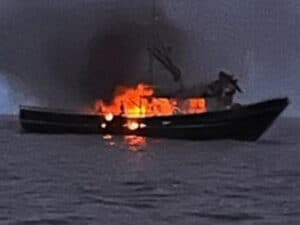
Thordon Seal retrofit keeps OTSV on-hire
Written by Nick Blenkey
Offshore tug supply vessel Hadi 31 during recent drydocking
Although keeping capital expenditure under control may be a key consideration during system procurement, any savings can quickly vanish if low cost components result in an increase in unbudgeted operational costs. That was the experience of Saudi Arabia-based ship operator Hadi Hamad Al-Hammam when the original shaft seals fitted to Hadi 37, a 2013-built twin-screw offshore tug supply vessel (OTSV), began to leak and vibrate, resulting in regular visits to dry dock for costly repairs.
To reduce the maintenance spend, the decision was reached to retrofit Thordon Bearings’ TG100 seals.
“The vessel’s existing arrangement did not perform as expected and for a vessel under charter to Saudi Arabian oil major Aramco, finding a system capable of reducing off-hire time was crucial,” said Rafid Qureshi, Managing Director of Dubai-based engineering and technical services companyOcean Power International LLC.
“The company approached us to source a more cost-effective solution,” said Qureshi.

“Hadi Hamad preferred the maintenance-free seal over other known brands. The costs of pulling a shaft and replacing a seal every 2.5 – 3 years, can go upwards of US$35,000 – $50,000 over the life of a vessel, which is well above the acquisition cost of a maintenance free alternative,” Qureshi continued. “The owner already had experience with Thordon products aboard the vessel – water lubricated XL propeller shaft and SXL rudder bearings fitted in 2013 as newbuild installations – so retrofitting the TG100 was an easy decision to make. We installed and commissioned a pair of 165 mm (6.5 inch) diameter seals at the Dubai Maritime City (DMC) drydock, in 2016.”
George Morrison, Thordon Bearings’ Regional Manager, said: “Competitor manufacturers often offer of a low capital product, hoping to recuperate costs with after sales in a repair and maintenance market where replacement parts and components can be expensive. We tend not to focus on this market – an approach that reflects in the reliability and quality of our products.”
During Hadi 37’s most recent classification survey, Hadi Hamad Al-Hammam, which operates a fleet of over 40 vessels, found the seals to be in “excellent working order.”
Khalid Zahran, Engineering Manager for Hadi Hamad, said: “We recently inspected the seals in dry dock and they were in perfect condition. We are highly satisfied with their performance.”

Since the installation, Ocean Power International says it has witnessed increased interest for Thordon’s bearings and seals for installation to newbuild projects.
“They say bad news spreads like wildfire, but so too does good news,” said Qureshi. “By word of mouth, there is a lot of interest in the region for Thordon products.”
The TG100 is a mechanical seal specially developed for 86 mm (3.375 inch) to 305 mm (12 inch) water lubricated propeller shafts typical of workboats, dredges, tugs, yachts, patrol crafts and other coastal vessels operating in either clean or dirty, abrasive waters.
The primary seal uses hard wearing, silicon carbide faces and Thordon’s proprietary elastomeric bellows to provide an unlimited shelf life compared to rubber-based bellows, which need periodic replacement. It also features a unique secondary seal with “Return to Port” capability. In the unlikely event that the primary sealing surface is damaged, this emergency function allows the shaft to turn at reduced speed enabling the ship’s safe return to port for repairs.




